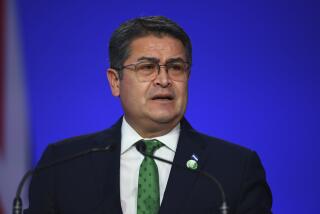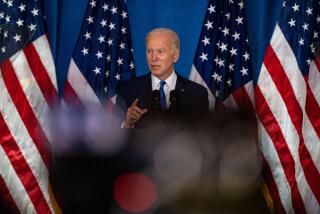Cabinet picks put focus on drug case
President-elect Barack Obama’s offer to make Rep. Xavier Becerra (D-Los Angeles) the next U.S. trade representative makes him the second Cabinet-level candidate to have been involved in President Clinton’s controversial 2001 commutation of a Los Angeles cocaine dealer’s prison sentence.
The other is Eric H. Holder Jr., whom Obama has nominated to be attorney general.
The dealer, Carlos Vignali, was convicted in 1994 for his role in a drug ring that delivered more than 800 pounds of cocaine -- worth about $5 million at the time -- from Los Angeles to Minneapolis. He was released after serving less than half of his 14 1/2 -year sentence.
Becerra was one of a number of Southern California political leaders who urged Clinton to consider commuting Vignali’s prison term in response to a campaign by Vignali’s father, Horacio, a Los Angeles businessman and developer who contributed to Becerra’s political campaigns. The senior Vignali also paid Hillary Rodham Clinton’s brother, Hugh Rodham, $204,000 to lobby for his son’s release.
Holder was Clinton’s deputy attorney general at the time of the clemency order. The Justice Department’s pardon attorney recommended that Clinton not commute the sentence, but Holder did not sign the letter to the White House.
Holder has denied any wrongdoing. He declined to comment Thursday night. But a transition official said complaints about the former judge and prosecutor amounted to partisan sniping by Republicans.
Becerra, a leading California Latino political figure who has been in Congress since 1993, also declined to comment.
But in the past, he has said that his communications with the White House were not meant as an explicit request for clemency but rather as a request that the case be reviewed.
On Thursday, Becerra met privately with Obama to discuss an offer to become the nation’s chief trade negotiator, but he is not certain whether he wants the job, according to a Democrat familiar with the matter.
A third official whose name surfaced in Vignali’s clemency case, Alejandro Mayorkas, now serves on the Obama Justice Department transition team.
At the time of the clemency grant, Mayorkas was the U.S. attorney in Los Angeles and was one of the Southern California officials who contacted the White House to urge consideration of Vignali’s release.
This and other controversial pardons and commutations occurred while Holder was in charge of the department’s Office of the Pardon Attorney, which reviews requests for pardons and commutations and passes along recommendations to the White House.
Pardon Attorney Roger Adams felt strongly that the department should be on record as opposing a commutation for Vignali, in concurrence with the prosecutors who had convicted him. Holder’s failure to sign the Pardon Office’s recommendation against clemency meant it went to the White House with the signature of a civil servant, giving the rejection recommendation less weight.
A 2002 congressional report by a Republican-led committee described Holder’s handling of the matter -- including his failure to follow the Justice Department’s usual process by signing the recommendation -- as “disturbing.”
It criticized Holder for “refusing to go on the record against a commutation the president apparently wanted to grant and the president’s own brother-in-law supported.”
The report suggested that Holder did so to please his superiors in the White House while trying to maintain his credibility as a prosecutor serious about law and order.
“Carlos Vignali satisfies none of the appropriate grounds for commutation identified in Justice Department regulations,” according to the report.
Holder’s signature on the recommendation was not required, the report noted. But the referral came at a time when the White House was complaining to Justice Department officials about receiving too many clemency applications with recommendations that they be denied.
“Apparently, he didn’t want to sign any more pardon denials,” Rep. Dan Burton (R-Ind.), the chairman of the House investigative committee, said at the time. “He was the deputy attorney general, and he didn’t want to sign a memo opposing a pardon of a major drug dealer. Why?”
An Obama transition official, Stephanie Cutter, said Thursday: “Dan Burton’s allegations are false. In his distinguished career in public service, Eric Holder has earned the support of prosecutors, law enforcement officials, and leaders of both parties because of his record of integrity.”
A second official with the Obama transition team said that Holder “doesn’t have any great recollection of this. It’s one of a million documents that went past his desk. We would love to give a detailed response, but this is an 8-year-old case and we are trying to put together the facts.”
The House committee report concluded that the Vignali commutation “mocked law enforcement” and “sent a message that there is a double standard of justice between the rich and the poor.” The report noted that 28 others in the same case who received equally stiff or stiffer sentences received no clemency, because their relatives did not have the political and economic pull to hire the president’s brother-in-law and make large campaign donations.
The federal judge who sentenced Vignali later complained that the commutation was inappropriate.
“Vignali was not a low-level operator in the conspiracy,” said U.S. District Judge David S. Doty in a statement reported by the Associated Press. “He played a major role in the financing, transport and procurement of the drugs.”
Horacio Vignali gave more than $160,000 in political donations, according to the House Committee report. Included in that total was more than $14,000 to Becerra’s congressional and mayoral campaign accounts.
Despite public attention to Becerra’s role in the Vignali case, the congressman has risen in power and influence in the House and in California.
As the White House was weighing what do about the Vignali petition in 2001, Mayorkas was among the most influential advocates of clemency.
According to the committee report -- which Democrats have decried as biased -- Los Angeles’ then-U.S. attorney spoke with several White House staffers to argue for Vignali’s release. One, Eric Angel, recalled Mayorkas saying that Vignali’s sentence was too long.
Another White House staffer said that Mayorkas’ advocacy was significant because it was unusual to receive a recommendation for clemency from a prosecutor.
Clinton aide Bruce Lindsey testified that the calls and letters from California leaders turned around his initial opposition to the clemency “given the community support.”
Mayorkas could not be reached for comment for this article. In the past, however, he has acknowledged making an error.
“It is reasonable to expect that someone in my position would do his or her due diligence to learn that information,” he told the Los Angeles Times in 2001. “I made a mistake.”
--
tom.hamburger@latimes.com
peter.nicholas@latimes.com
More to Read
Get the L.A. Times Politics newsletter
Deeply reported insights into legislation, politics and policy from Sacramento, Washington and beyond. In your inbox three times per week.
You may occasionally receive promotional content from the Los Angeles Times.






